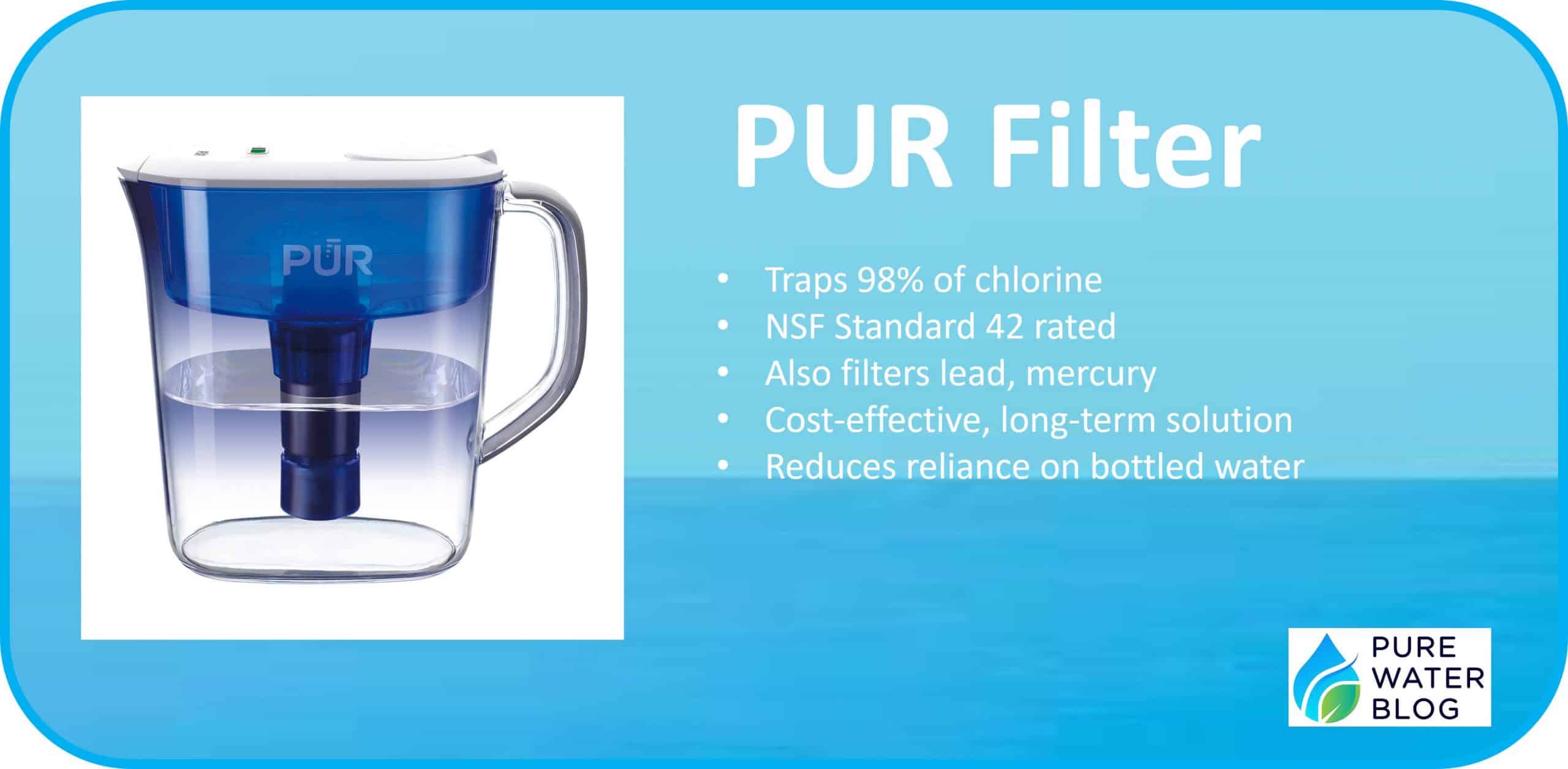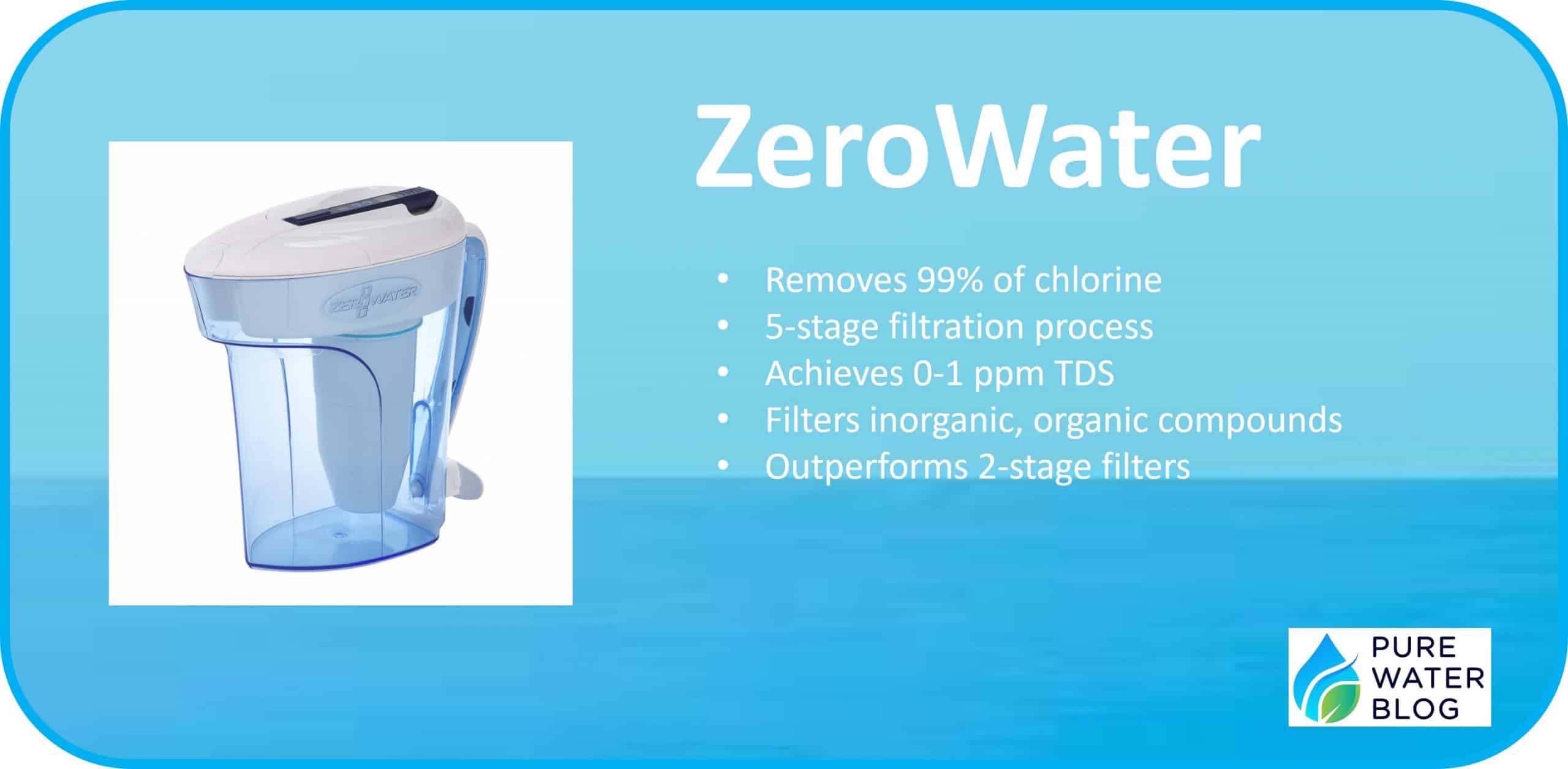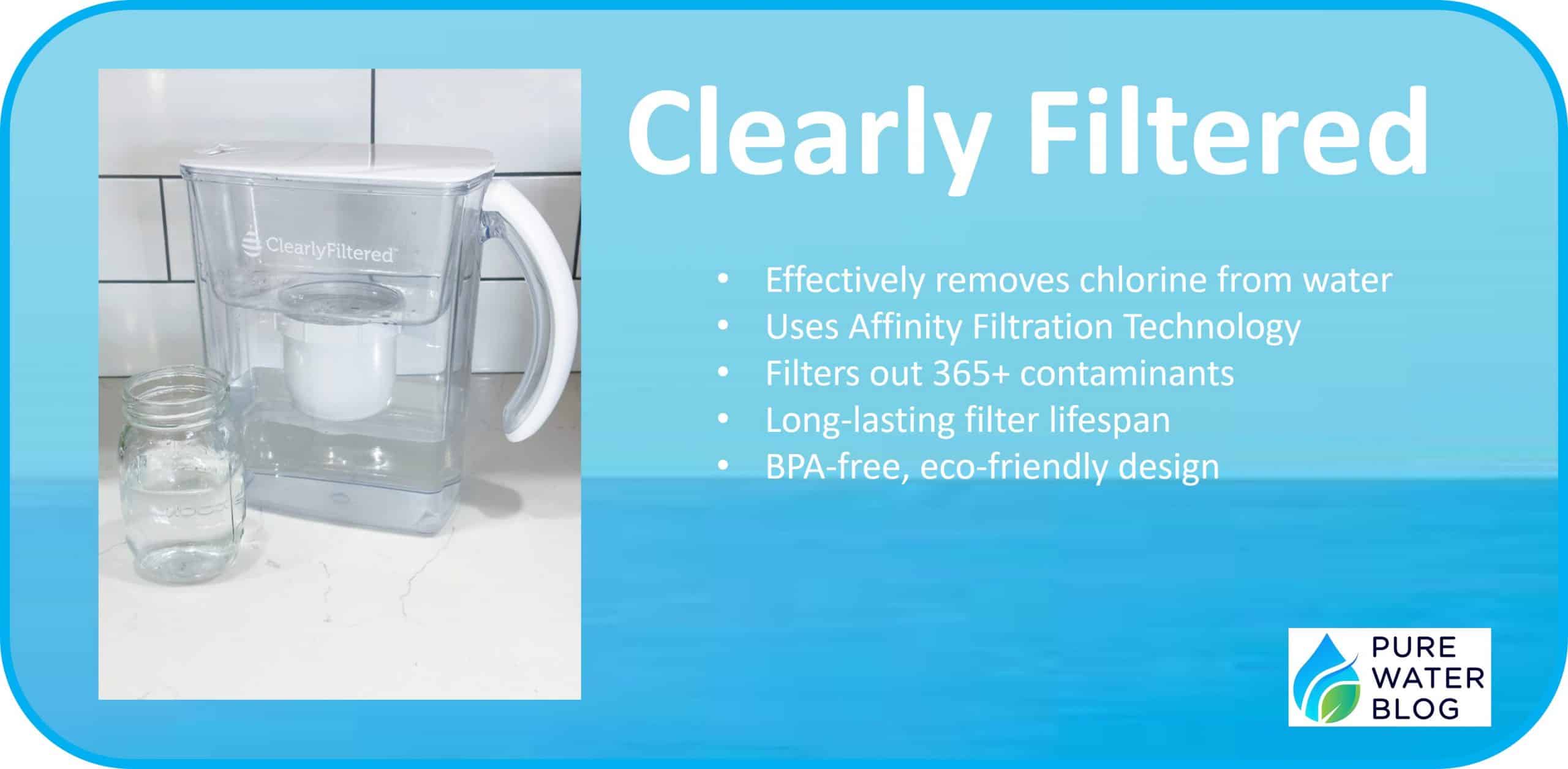Are you concerned about the presence of chlorine in your drinking water and looking for a solution? In this article, we’ll explore pitcher water filters that remove chlorine, helping you make an informed decision to improve the safety and taste of your water.
All pitcher water filters effectively remove chlorine from your drinking water using activated carbon filtration technology. Brands like Brita, PUR, ZeroWater, and Clearly Filtered offer pitcher filters that significantly reduce chlorine levels, improving the taste and safety of your water. These filters also remove other contaminants such as lead and PFAS.
In this article, we dive deep into the various pitcher water filters that remove chlorine, compare their features, and help you choose the best option for your home.
Read my comprehensive article about chlorine removal filters and treatment.
Table of Contents
How Do Pitcher Filters Remove Chlorine
Water pitcher filters are designed to remove contaminants, including chlorine, from your drinking water. They usually rely on activated carbon filters, which have a large surface area and are highly porous. When water passes through the filter, chlorine and other contaminants are attracted to the carbon surface and become trapped, leaving your water cleaner and better tasting.
Watch my video about chlorine removal with a Brita pitcher filter.
Top Pitcher Water Filters for Effective Chlorine Removal
There are several pitcher water filters available on the market that effectively remove chlorine. We’ll explore some of the most popular and efficient options below.
Do Brita pitcher filters remove chlorine
Brita is a well-known brand in the water filtration industry, and their pitcher filters are popular for removing chlorine. They offer an extensive lineup of products designed to reduce chlorine taste and odor in drinking water, ensuring you have access to fresh, great-tasting water.
Their filters include:
- Stream pitcher filters
- Standard filters
- Longlast+ Filters
- Brita bottles
- Faucet systems
All Brita filters utilize activated carbon media, a proven technology for reducing chlorine concentrations in water.
Read my article exploring the topic do Brita filters remove chlorine.
Brita Longlast Everyday Water Filter Pitcher: Maximum Chlorine Removal
The Brita Longlast Everyday Water Filter Pitcher comes equipped with the Longlast filter, specifically designed for maximum chlorine removal. This pitcher filter is NSF certified to reduce chlorine taste and odor in your drinking water, providing clean and refreshing water. The Longlast filter also effectively removes a wide range of contaminants for improved water quality.
Chloramines and Brita Filters: A Limitation
Chloramines, another disinfectant used in some water supplies, can be challenging to remove from water. Activated carbon can reduce chloramine levels, but it may not entirely eliminate them. Pitcher filters, in particular, have limited contact time with the water, which can impact their ability to remove all contaminants.
Brita does not claim to remove chloramines from drinking water, suggesting that their filters may not be fully effective against this particular chemical. However, this does not mean their filters are ineffective overall; it merely highlights a limitation in their ability to remove chloramines.
Brita Simple Filter: Effective Chlorine Removal
Brita’s Simple filters effectively remove chlorine from water using activated carbon, significantly improving tap water taste and quality. According to Brita’s website, the Simple filters are specifically designed to reduce chlorine levels in drinking water.
Brita Longlast+ Filter: High-Performance Chlorine Removal
The Brita Longlast+ filters excel at removing chlorine from drinking water. These filters employ a carbon block media that can reduce chlorine concentrations by over 99%. Brita claims on their website that the Longlast+ filter can remove up to 99% of chlorine from water, ensuring you have access to clean and refreshing drinking water.
Do PUR pitcher filters remove chlorine
PUR pitcher filters also use a combination of activated carbon and an ion-exchange resin to reduce chlorine levels in water. They are designed to remove a wider range of contaminants, including lead and certain pharmaceuticals, making them a great choice for those seeking advanced filtration.
Read my article exploring the topic do PUR filters remove chlorine.
NSF certification
PUR pitcher and faucet filters have earned the NSF Standard 42 rating, ensuring their ability to effectively trap and filter chlorine from your drinking water. This rating indicates that the filtration system is capable of removing contaminants that affect the taste and smell of drinking water, making them an excellent choice for those dealing with unpleasant local water conditions.
PUR Faucet Filter: Cleaner, Filtered Water with Greater Contaminant Reduction
Priced at $15.99, the PUR Faucet Filter offers a convenient and affordable way to enjoy cleaner, filtered water right from your tap. This filter is certified to reduce lead and removes up to 10 times more contaminants than the leading Brita pitcher filter^1,2, providing you with a superior filtration solution.
Not only is the PUR Faucet Filter effective at filtering lead, but it also has a long-lasting performance, capable of filtering up to 100 gallons of water or lasting up to 3 months. This filter is compatible with all PUR Faucet Filtration Systems, ensuring a seamless integration into your existing setup.
PUR Faucet Filter: Cleaner, Filtered Water with Greater Contaminant Reduction
The PUR Faucet Filter offers a convenient and affordable way to enjoy cleaner, filtered water right from your tap. This filter is certified to reduce lead and removes up to 10 times more contaminants than the leading Brita pitcher filter, providing you with a superior filtration solution.
Not only is the PUR Faucet Filter effective at filtering lead, but it also has a long-lasting performance, capable of filtering up to 100 gallons of water or lasting up to 3 months. This filter is compatible with all PUR Faucet Filtration Systems, ensuring a seamless integration into your existing setup.
PUR Pitcher Filter: Faster Filtration and Enhanced Contaminant Reduction
Priced at $19.99, the PUR Pitcher Filter allows you to enjoy cleaner, filtered water by replacing the filter in your water pitcher or dispenser. This filter is certified to reduce 2 times more contaminants than the leading Brita pitcher filter^1,2, ensuring superior water quality.
The PUR Pitcher Filter not only reduces chlorine for improved taste but also filters water twice as fast³, providing quick and convenient access to clean drinking water. Each filter has a lifespan of up to 40 gallons or 2 months, offering consistent performance. Compatible with all PUR Pitcher and Dispenser Filtration Systems, this filter is an ideal choice for maintaining the quality of your drinking water.
Do ZeroWater pitcher filters remove chlorine
ZeroWater filters are designed to effectively remove chlorine from your tap water. Tests conducted on 40 gallons and 20 gallons of water have shown that these filters can remove up to 99% of chlorine, ensuring high-quality drinking water.
Read my article exploring the topic do ZeroWater filters remove chlorine.
How ZeroWater filters remove chlorine
To comply with FDA regulations, all water filters must meet specific requirements to ensure consumer protection and product effectiveness. Filters are required to have a Total Dissolved Solids (TDS) level of around 200 ppm or less. For reference, bottled water has a TDS of 0 to 1 ppm, tap water averages 500 ppm, and anything above 1,000 ppm is considered unsafe for consumption.
ZeroWater Filters reduce water TDS levels to 0 to 1 ppm, on par with FDA standards for bottled water. This is achieved through a unique 5-stage filtration process, as opposed to the standard 2-stage filtration found in most filters.
ZeroWater’s Five-Stage Filtration Process
- Stage 1: Coarse Filter Screen – This stage removes large particles or solids such as rust or dust, which are primarily responsible for clouding tap water.
- Stage 2: Foam Distributor – The filtering process continues as the foam distributor captures any remaining solids or particles that may have slipped past the initial filter screen.
- Stage 3: Multi-Layered Activated Carbon and Oxidation Reduction Alloy – This stage removes organic compounds like herbicides from the water. It is also responsible for eliminating chlorine, mercury, and chloramine.
- Stage 4: Dual Comprehensive Ion Exchange Resin – While the previous stage targeted organic compounds, this stage focuses on removing inorganic compounds such as metals, non-metals, and radiological contaminants.
- Stage 5: Ultra-Fine Screen and Non-Woven Membrane Layers – As the final stage, this ultra-fine screen and membrane capture any remaining solids that managed to bypass the previous filtration stages.
By utilizing this comprehensive 5-stage filtration process, ZeroWater Filters effectively remove chlorine and various other contaminants, providing you with clean and safe drinking water.
Do Clearly Filtered pitcher filters remove chlorine
Clearly Filtered offers a pitcher filter that uses their proprietary Affinity Filtration Technology to remove chlorine and a wide range of other contaminants. Their filters are designed to last longer and remove more contaminants than traditional pitcher filters.
Comparing Water Pitcher Filters for Optimal Chlorine Removal
| Filter Brand | Filter Lifespan | NSF Certification | Price Range |
| Brita | 40 gallons | 42, 53, 401 | $15 – $40 |
| PUR | 40 gallons | 42, 53, 401 | $20 – $50 |
| ZeroWater | 20 – 40 gallons | 42, 53, 401 | $25 – $50 |
| Clearly Filtered | 100 gallons | 42, 53, 401 | $50 – $100 |
The Role of Chlorine in Drinking Water
Chlorine is a disinfectant commonly used by municipal water treatment plants to kill harmful bacteria and other microorganisms in drinking water. It helps prevent waterborne diseases and ensures a safe water supply. However, chlorine can have some downsides when it comes to taste, odor, and potential health effects.
Why is chlorine in my drinking water?
Chlorine is added to water during the treatment process to disinfect it. The chlorine reacts with the water, forming hypochlorous acid and hypochlorite ions, which are effective at killing bacteria and viruses. Once the water is disinfected, it is distributed through pipes to homes and businesses.
Potential health effects of chlorine exposure
While chlorine is effective at killing harmful microorganisms in water, it can also react with organic matter to form disinfection byproducts (DBPs), such as trihalomethanes and haloacetic acids. Some studies suggest that long-term exposure to these DBPs may increase the risk of certain health issues, including cancer and reproductive problems. However, the risk is relatively low, and the benefits of using chlorine as a disinfectant generally outweigh the potential risks. Some people may also be sensitive to the taste and smell of chlorine in their drinking water, making it less enjoyable to drink.
Testing for chlorine in your water
To test for chlorine in your water, you can use a chlorine test kit or test strips, which are widely available online and in stores. These tests are simple to use and provide quick results, helping you determine if your water contains chlorine and if a water filter might be a good investment.
Methods for Removing Chlorine from Drinking Water
There are various methods for removing chlorine from drinking water, including:
- Activated carbon filters: These filters are commonly found in pitcher filters, faucet filters, and under-sink filters. They effectively remove chlorine and improve the taste and odor of water.
- Whole house carbon filters: These systems filter water as it enters your home, removing chlorine and other contaminants before they reach your faucets.
- Reverse osmosis systems: These systems use a semipermeable membrane to filter out contaminants, including chlorine. They are typically installed under the sink and require more maintenance than carbon filters.
Combining Different Filter Technologies for Optimum Results
For the best results in removing chlorine and other contaminants from your drinking water, consider using a combination of filtration technologies. For example, you could use a pitcher filter for daily drinking water and a whole house carbon filter to reduce chlorine levels throughout your entire home.
Key Factors and Considerations for Chlorine Removal
When selecting a water filter to remove chlorine, consider the following factors:
1. The importance of NSF testing and certification
Look for filters that have been tested and certified by NSF International, an independent organization that verifies the performance and safety of water treatment products. Filters with NSF certifications for Standards 42 and 53 are specifically designed to reduce chlorine and other common contaminants.
2. Evaluating component quality
Choose filters made from high-quality materials and components to ensure they are durable and effective at removing contaminants. This may include BPA-free plastics, food-grade stainless steel, and high-quality activated carbon.
3. Considering the cost of replacement filters
Consider the upfront cost of the filter, as well as the ongoing cost of replacement filters. Some filters may have a higher initial cost but lower long-term costs due to longer filter lifespans or more affordable replacement filters.
4. Assessing additional contaminant removal capabilities
While your primary concern may be chlorine removal, it’s worth considering filters that also remove other contaminants, such as lead, pesticides, and pharmaceuticals. This will help ensure you have the cleanest and safest drinking water possible.
Choosing the Best Water Filter for Chlorine Removal
Selecting the best water filter for chlorine removal depends on your specific needs, preferences, and budget. Consider the factors mentioned above, as well as the specific features and benefits of each filter, to make an informed decision.
Exploring Various Types of Chlorine-Removing Filters
There are several types of water filters that can effectively remove chlorine from your drinking water, including:
Whole-house carbon filters
These systems are installed at the point where water enters your home, filtering out chlorine and other contaminants before they reach your faucets. They provide clean, chlorine-free water throughout your entire home.
Pitchers and dispensers for chlorine removal
Water filter pitchers and dispensers are a convenient and affordable option for removing chlorine from drinking water. They use replaceable activated carbon filters to reduce chlorine levels and improve taste and odor.
Under-sink carbon filters: A convenient option
Under-sink carbon filters are installed directly under your sink, providing filtered water through a dedicated faucet. They are a more permanent solution than pitcher filters and require less frequent filter changes.
Reverse osmosis systems for superior chlorine filtration
Reverse osmosis systems use a semipermeable membrane to filter out contaminants, including chlorine. They are typically installed under the sink and provide high-quality, purified water. However, they require more maintenance than carbon filters and may produce wastewater during the filtration process.
Read my extensive article about reverse osmosis filters for chlorine removal.
Faucet filters: Easy-to-install chlorine removal
Faucet filters attach directly to your existing faucet, filtering water as it flows through the faucet. These filters are easy to install and maintain and are an affordable option for reducing chlorine levels in your drinking water.
Frequently Asked Questions
Are there other ways to reduce chlorine in my water besides using a filter?
Yes, allowing water to sit uncovered for several hours or using a water aerator can help dissipate chlorine. Boiling water can also help remove chlorine, but it’s not as effective as using a filter specifically designed for chlorine removal. Refrigerator filters are effective at removing chlorine from tap water.
Can chlorine be found in well water?
Chlorine is typically not present in well water unless it’s been intentionally added as a disinfectant. However, well water can contain other contaminants, so it’s important to test your water regularly and consider a filtration system if necessary.
Can boiling water remove chlorine?
Boiling water can help remove some chlorine, but it’s not the most effective method. Using a water filter designed for chlorine removal is the best way to ensure your water is free of chlorine and other contaminants.
How can I ensure my selected filter effectively removes chlorine?
Choose a filter that has been tested and certified by NSF International for chlorine reduction (Standard 42). This ensures the filter meets specific performance requirements and will effectively remove chlorine from your water.
Final Thoughts on Chlorine-Removing Pitcher Water Filters
Investing in a chlorine-removing pitcher water filter can greatly improve the taste and safety of your drinking water. By considering factors such as NSF certification, filter lifespan, and additional contaminant removal capabilities, you can select the best filter for your needs. Remember to maintain your filter according to the manufacturer’s recommendations to ensure optimal performance and enjoy clean, great-tasting water.
Key Takeaways
| 1. Activated carbon filters are effective at removing chlorine from water. |
| 2. Look for filters with NSF certification for chlorine reduction. |
| 3. Consider the cost, filter lifespan, and additional contaminant removal. |
| 4. Combine different filtration technologies for optimal results. |
| 5. Regularly maintain your filter for best performance. |

